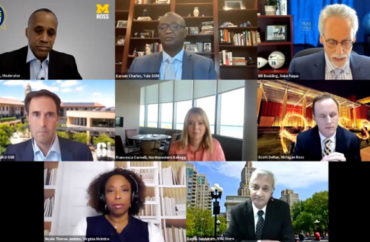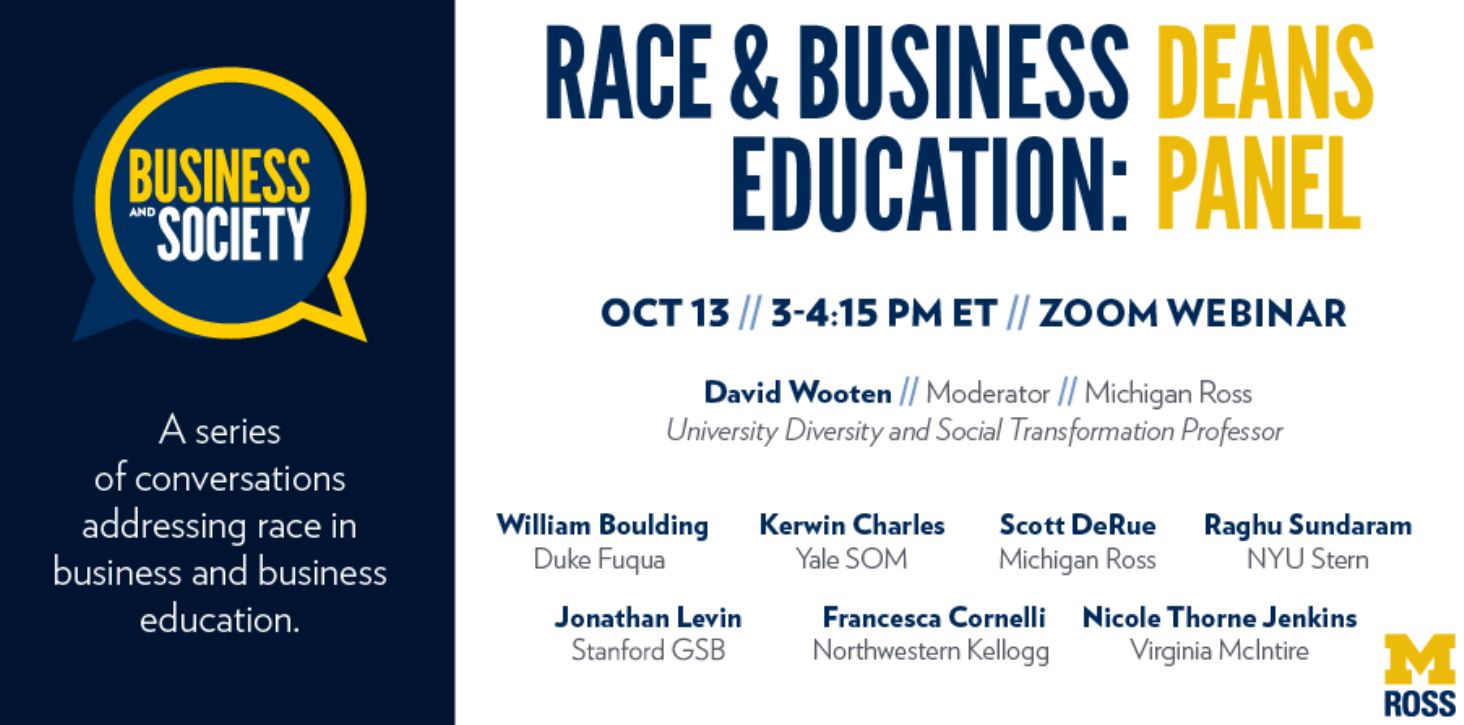
Should calculus be required in business schools? Should GPA trump “lived experiences” in business school applications? Should business professors infuse diversity and inclusion topics into traditional business courses that don’t necessarily call for such discussions?
These questions and more were broached among a panel of deans from America’s top business schools. The panelists tackled “the challenges and opportunities they face in their efforts to prepare their graduates to be inclusive leaders of a racially diverse workforce,” according to organizers.
It was hosted by the University of Michigan’s Ross School of Business.
“In thinking about anti-blackness, for example, it has a decidedly local and American flavor,” said Dean Kerwin Charles of Yale University’s School of Management.
Charles decried the presence of “innocent, misinterpretation, accidental offense giving and the like” by American students that can occur at business schools.
“Insensitivity, ignorance, unfamiliarity with these matters [of anti-racism] raises the likelihood of an unpleasant, albeit unwitting, but an unpleasant interaction, which can affect the experience of their peers,” he said.
Moderator David Wooten began the discussion by asking, “How have perspectives on race changed in business education over the course of your academic career, and what are some of the factors that contribute to these changes?”
Jon Levin, dean of Stanford’s Graduate School of Business, remarked on the diversity of current students compared to leaders of the business world.
“[T]he picture that immediately comes to mind is to compare what [students’] faces look like to the Fortune 500 CEOs or the leading investors in this country, the top venture capitalists or entrepreneurs or board members — and it’s just very different,” he said.
According to Levin, the diversity of business students is due to “a concerted effort around diversity, equity, and inclusion” which Stanford started three years ago.
After that, Dean William Boulding of Duke University’s Fuqua School of Business talked about his school’s focus on creating a diverse faculty body as well as a diverse student body.
“From the representativeness dimension, we started to look at inclusiveness, not just counting numbers and getting people in the game, but making sure that people felt like they were on the team, and so I think a number of schools started to work on those dimensions that are very important to the community,” he said.
Wooten then turned to two other deans on the panel “to offer their thoughts on how we should think about [diversity, equity, and inclusion] issues as global business schools, when some of the issues, specifically those around racial justice, are local?”
Northwestern’s Kellogg School of Business Dean Francesca Cornelli commented on the existence of racism throughout the world. A native Italian, Cornelli worked in London for 25 years before coming to the United States.
“I find it very humbling,” she said, “to think that in completely different systems, different sets of institutions, different history, different everything, and yet we still find racism. So that is telling us how complex the problem is.”
“Right now in the UK they’re talking about problems with racism in the Met Police in London; in France, in my country, Italy, there are longstanding discussions of racism,” she told Wooten.
Dean Raghu Sundaram of New York University’s Stern School of Business asserted that “America has soft power — the power of the media and culture – -and its reach is simply enormous.”
According to Sundaram, this power is a double-edged sword.
“The relentless negative portrayal of Black people in media and literature influenced how people in many other countries, many of whom had no direct contact with Black people, view Black people. And it has resulted today in the significant casual racism that Black people face when they travel in Asia and elsewhere,” he said.
“But equally,” he said, “that soft power has the ability to do enormous good, as we have seen with the women’s rights movement, the gay rights movement, many other movements in America.”
Because of the possible negative effects of the media’s soft power, Sundaram said that all students at Stern must take the Intercultural Development Inventory Assessment, which is used “to gauge cultural competence.” In addition, NYU business students are assigned a “coach” who interprets their assessments and assigns them “a plan for growth.”

The next question from Wooten was: “This isn’t a requirement that you give us a grade, but how well are business schools doing with respect to issues of diversity, inclusion, and racial justice, compared to industry? Are we leading or lagging behind?”
Sundaram was the first to chime in.
“Honestly, I think it would be hard to argue that we are not doing better than industry,” he said.
Sundaram echoed Levin’s observation about universities being more diverse than many Fortune 500 companies.
“We start by looking at the student body. And that means we have to work hard to not just diversify the student body from amongst the applicants, but remove the obstacles, both real and perceived, that typically have discouraged some historically disadvantaged group from even applying to business schools,” Sundaram said.
Dean Nicole Thorne Jenkins of University of Virginia’s McIntire School of Business disagreed, however.
“I think we’re lagging. And I think we’re lagging substantially in part because there’s a huge difference between what we as universities aspire to what we say we are, and the actual lived experiences of historically marginalized people,” she said.
“And when you go into a corporation or some other organization post-university,” Jenkins said, “you’re actually in a more homogeneous set of people, even though there may not be tremendous racial diversity. You are more similar in terms of social economics.”
Another reason why universities are lagging, according to Jenkins, is the balancing of “free speech issues.”
“We cannot control students, staff, and faculty the way that corporations can — they have much greater control over the individuals who work there,” she said.
Scott DeRue, dean of the University of Michigan’s Ross Business School, attempted to balance the two sides: “I think we’re leading and lagging.”
“When we look across universities and business schools, I think more often than not we are coming to the realization that racial justice and other forms of justice are a core part of our mission,” he said.
“And if I compare that to industry, many companies, many organizations around the world, I don’t think have woken up to the opportunity and the responsibility to have diversity, equity, and inclusion as a core part of their mission.”
At the same time, DeRue named some ways in which he believed universities are not up to par.
“In my opinion business schools are not as creative about where they go to discover and recruit talent relative to some companies and industry partners. I mean, look at companies like LinkedIn. LinkedIn reduced its on-campus recruiting across universities by 73 percent and increased its [underrepresented minority] hiring by 23 percent,” he said.
DeRue also mentioned Ross Business’s Blau Initiative for Diversity in Real Estate, which is an antidote to what he called “an industry-wide problem in real estate.”
Next, Wooten asked the following questions: “How are we doing, or perhaps, what’s stopping us from doing better? What are the major structural or cultural challenges that business education faces in becoming more diverse, equitable and inclusive?”
Charles chimed back in, saying that there are ways in which business schools are “not doing badly.” Nevertheless, he said that there was a “structural impediment” to diversity, equity and inclusion initiatives because “there are fields represented in schools and business that don’t naturally include diversity talk.”
He said that some students he talked to were “surprised” that some faculty at top universities oppose diversity initiatives, and he called for the initiatives to be “interwoven” into curricula.
“The point is that a university, unlike business, unlike other things — we traffic in ideas. And I would want us collectively to be a place where, during their two years, students feel comfortable in spaces created for that kind of open, vigorous, and free conversation,” he said.
DeRue followed him and talked about how the admissions processes in business schools can “undermine” their commitment to diversity.
He said that “our rankings of favorite things like selectivity, test scores, GPA is over diversity, or over inclusion or equity, in terms of the lived experience of students, for example.”
Jenkins answered in a similar way.
She said that she often asks colleagues, “Do we really need calculus, or are only some aspects helpful to finance and accounting majors? And if we know that students from low-income backgrounds are less likely to have had calculus in high school, are we then creating a perfect storm where students from specific backgrounds are going to be less able to gain admission?”
According to Levin, “the areas that are the most difficult have to do with creating an environment on our campuses that enables us to benefit from the changes in the composition of our students and faculty that puts people, as Kerwin said, in collision with one another in productive ways.”
Wooten’s next question to the deans was “What approaches can leading business schools take to increase the diversity of their student body?
Boulding was the first to answer. He said that it is important for people to realize that not everyone will be fully on board with their efforts: “In fact, what we know in terms of system change is that the more you try to drive these changes, the more the status quo will organize to resist those changes.”
He also decried the “false dichotomy of ‘either you choose diversity or you choose excellence.’”
Finally, Boulding said that he did not believe that the free market would rule out discrimination through competition.
“Even those of us who are economists by training realize that markets fail. And so we have to make sure that people understand that markets fail, and that we need to take actions that will in fact remediate some of these issues that are so persistent, and if you ignore those — if you ignore those narratives — I think you do so at your peril,” he said.
Levin talked about some initiatives that he is overseeing at Stanford, including partnering with historically black colleges.
Wooten then modified the question for the other deans: “What can we do to increase the diversity of faculty and staff?”
Jenkins recommended evaluating faculty on their “ability to create inclusive classrooms.”
Sundaram focused on Ph.D. candidates. He elaborated on a program called “Diverse Pathways” at NYU. In the program, the university takes students from “underrepresented populations” and allows them to engage with faculty over a two-day span, and they are encouraged to apply to the business school.
Cornelli called for making diversity initiatives “a strategic issue,” while DeRue integrating diversity into “business fundamentals.”
In the end, Wooten invited each dean to offer some “parting thoughts.”
Boulding was the first to comment. In his closing statement, he said, “the scarcest dimension of genius that we need is not IQ; it’s not even EQ or emotional intelligence, but DQ, or a decency quotient.”
Charles summed up the at-large theme of the panel.
“And so we cannot prepare people for successful careers in society broadly and business narrowly unless they have come into close contact, meaningful contact, with a diverse, heterogeneous group of people during their training,” he said.
He also said that people have “a moral obligation to amend the system, our institutions, that played a role in generating some of the racial inequities we observed.”
Cornelli, who called herself “an optimist,” said, “I feel there is progress being made, you hear people talking about this, talking about racial injustice, and there is momentum. It doesn’t make the problem easy, but I think if we can we must work right now as hard as possible.”
Jenkins disagreed with the idea prominent in American colleges that “If you work hard, you go to college, you’ll have a great career — and it all depends on you.”
“The reality is,” she said, “there’s so many other things around you that determine your success. The family of origin that you have, the passport that you hold, and the race that you are.”
Though Jenkins was pessimistic, Levin, like Carnelli, carried a tone of optimism.
“[2020] has focused all of our attention on the issues of race in an incredibly productive way — and in a way that has a lot of potential to help the whole country,” he said.
“This is a time for action,” Sundaram concluded. “It is a time for us to move together on what we’re doing, but it is also a time to make sure that we don’t lose the dreams of a better future, and we have a precise idea in mind of what it is that we’re moving toward.”
DeRue closed the panel, calling himself “an unwavering optimist.”
“We need a sustained movement,” he said, “whereby all business schools, all universities, embrace the importance of diversity, equity, and inclusion as a core part of our values and our mission. We need a sustained movement whereby we recruit diverse talent and help them develop the skills to thrive in a diverse workforce.”
MORE: American Economics Association dominated by Democrats, study finds
IMAGE: YouTube screenshot
Like The College Fix on Facebook / Follow us on Twitter






Please join the conversation about our stories on Facebook, Twitter, Instagram, Reddit, MeWe, Rumble, Gab, Minds and Gettr.